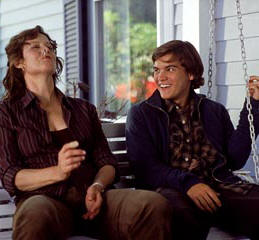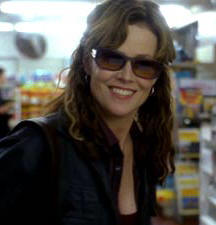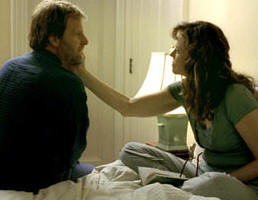Copyright ©2005
PopEntertainment.com. All rights reserved.
Posted:
April 6, 2005.
Actress Sigourney
Weaver has been an action film hero since the days when she first appeared
as the avenging survivor in the film Alien. But besides her
blockbusters such as Ghostbusters, she’s performed in a string of
critically acclaimed films of emotional depth such as The Ice Storm,
Gorillas in the Mist and The Year of Living Dangerously. Now
the 50-something former Oscar nominee may not be tackling blockbusters but
she is wrestling with smaller indies grappling with difficult subjects as
she does in her latest, Imaginary Heroes — the story of family
falling after the oldest son commits suicide.
You’ve done small
movies before – like
A Map of the World
and The Guys — and have been heart-broken because they weren’t
widely seen. Do you worry as film such as Imaginary Heroes go into
the marketplace?
I always worry. I’ve
managed to be in these films that open for a week right at the end of the
year [for Oscar consideration] and then have them reopen once you’ve lost
some of the momentum. So I’m very aware of trying to get the word out,
especially in this case, to the younger generation, because I think this
is a young person’s film. It would be great if it could play long enough
for a lot of college kids to see this, because it’s really worth seeing.
It was hard on Death and the Maiden. It got harder on A Map of
the World. It was weird on The Guys. By this time, I try to
keep my expectations very minimal. The work is there. If it doesn’t reach
its audience it will be on DVD. I’m confident that this film is so good
that eventually it’s going to find its audience and be acknowledged. But
the rest of it, it’s just a total crapshoot, which is too bad. But I’d
rather do the work and suffer all that than not get those films.
Imaginary Heroes
goes to emotional depths not seen in a lot of American films lately. Are
American movies gaining more depth and quality?
That’s a good
question. I don’t know what the next four years are going to bring,
frankly. All I know is, having done some theater in the last year; people
are very, very in need of the arts. I feel that when people come to the
theater now things are so confusing that they’re really looking for some
kind of illumination and bonding experience with other people. So I do
think that the audience is going to make more demands on movies because we
need to be helped through this. You can tell I’m a Democrat. I just think
that we need to be useful to people. I can’t think of many good things
that are happening now, but one of the good things that might happen is
that the
work is going to change. How it’s going to change I don’t know how to
predict but I do think something’s going to happen.
things are so confusing that they’re really looking for some
kind of illumination and bonding experience with other people. So I do
think that the audience is going to make more demands on movies because we
need to be helped through this. You can tell I’m a Democrat. I just think
that we need to be useful to people. I can’t think of many good things
that are happening now, but one of the good things that might happen is
that the
work is going to change. How it’s going to change I don’t know how to
predict but I do think something’s going to happen.
In this movie you and
co-star Emile [Hirsch] have a wonderful mother/son relationship. Did you
discuss it much?
We both wanted to
meet a little before we started. So we had dinner with Dan [Harris, the
director,] maybe the night before rehearsals started. Though I don’t know
Emile that well, my impression is that he’s very close to his parents, and
I’m kind of close to my daughter. So I think a lot of that was there, but
it was really easy to find that with Emile. He’s very available. It’s a
really special relationship, this sort of weird situation which may be
common, where one child ends up belonging to one parent and another child
ends up belonging to the other parent. It was really interesting to me,
psychologically, that that would happen and that the parents would allow
that to happen in such an obvious way, with pretty devastating results.
Emile is a
fast-rising star. What do you think about him as an up-and-coming star?
Well, it’s funny, I
think he’s wonderful as Tim, and Emile himself is very entertaining. He’s
very smart, very fast on his feet. He’s got a lot of presence, works very
hard, is very devoted and he’s very nice. I think he can do comedy. I
think he can do drama because it was an independent film—we shot it in 35
day–you’re almost always working with someone. There’s no time, really, to
get to know them outside the film but I really felt he gave it his all, as
we all did. I loved seeing all those scenes that Sandy’s not in, all those
parties that are a parent’s nightmare [where kids go here…] “Take this. I
don’t know what it is,’ and they take it anyhow.”
Did you talk with
other parents to get another perspective on that dynamic?
No…I think of films
as like a little surprise box. I talked to my husband about it. I wouldn’t
have known how to present the Travises to other parents because I think
they’d go, “What? The oldest son commits suicide and they then realize
they’re doing something wrong?” If you couldn’t read the script and
[realize] how compassionately the script approaches all these people and
their spiraling
out of control [lives], it would be very hard to find a map through it.
I’m always very leery of mentioning what I’m doing to other people because
I feel like part of the power comes from the secrecy, in a way, of this
world.
At this point in your
long career, do you make suggestions when you’re doing a film being made
by people with far less experience than you?
Actually, I did open
my big mouth on this film a couple of times because when you have no money
and have no time people want to hurry you, hurry the lighting, hurry some
of the other aspects of filmmaking. So, in the beginning, the one thing I
did do was had a little chat with the A.D., who was always screaming at
us. It just wasn’t working. People weren’t being lit and everyone was
really tense. You may not have much money, but you don’t have to to make a
good film. So I just wanted to say, having been on lots of high-pressure
pictures, this was not going to solve the problem. It was going to make it
harder for us to do what we needed to do. And I got that message through.
In the old days I don’t think I would have had the confidence to speak out
like that.
You’re New York-based
and have had an amazing career but some New York actors say they had to
move out to LA to pursue film careers.
I really haven’t
heard that but it’s worth it to be here. There are as many filmmakers in
New York as there are in LA. I think the actors are here, too, especially
the younger ones, because they are still trying to do theater. The only
thing that’s not here are the studios, and that’s sometimes an advantage;
the fact that we’re not in an industry town [is great]. You’re surrounded
by so many people who think that what they’re doing is the most important
thing, and it has nothing to do with the industry. That helps you keep
your perspective. Even if you don’t have a job you can go out and see
great theater, go out and hear great music. You can nourish yourself with
the arts while you wait for the right job to come. My role models were
Jessica Tandy and Hume Cronyn, who lived out west for a while when he was
writing [but essentially were in New York]. But I always trusted that you
could have a good career here. If it was an expensive movie they’d have
the money to come and interview you here and there are a lot of
independent films that are made here.
What films have you
liked lately?
Oh my God! Well, the
films I enjoyed this year were Hotel Rwanda, Kinsey, Collateral and
I liked Sideways. I thought there were some really interesting
films.
What films influenced
you to go into acting or influenced in your work?
When I was an adult I
fell in love with Ernst Lubitsch, and I loved all of his films
unreservedly. They’re fantastic and I could watch them all again and
again. I love it when comedy and drama are presented together, and all the
values of each, and no one does it better than Lubitsch, though I think
Mike Nichols is pretty awesome as well. I personally love Ninotchka.
I love Melvyn Douglas and Greta Garbo together, and I love those actors
who were in all of Lubitsch’s films, those guys who played the Russians.
They’re so ridiculous.
And are there films
that changed your life?
That’s interesting.
The next film I’m doing is a film with Alan Rickman called Snowflake
in which I play a woman on autism spectrum. I’ve spent the last nine
months spending time with people on the spectrum. We’re all on the
spectrum. It just may be more obvious in certain people. Its things like
that that you end up discovering when you’re researching a film. You don’t
really know when you start how it’s going to impact on you, but it’s
really profound.